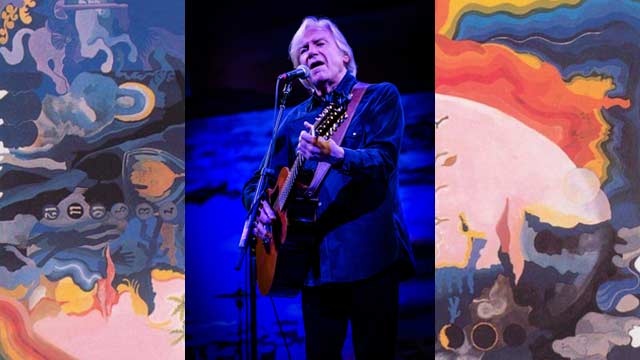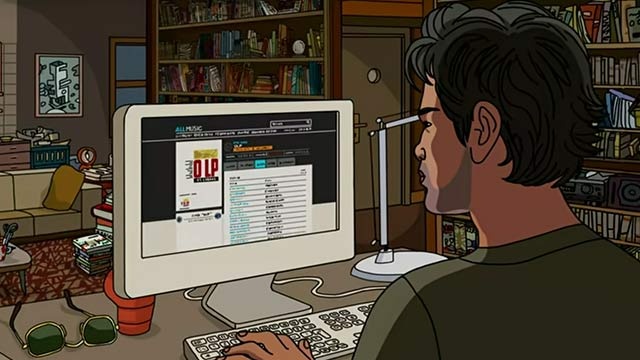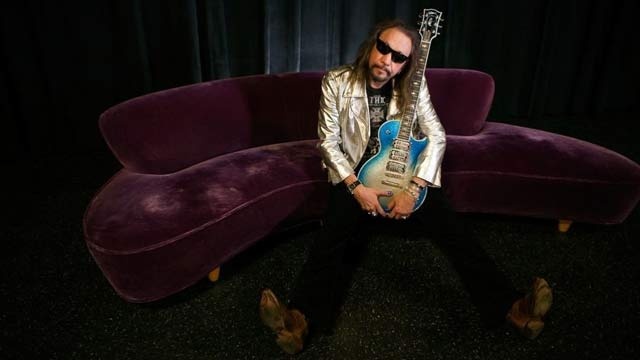Hayward spoke to AllMusic just as the spring leg of his US tour was winding down (visit his official site for a complete set of upcoming dates), and discussed his newest single, if he helped trailblaze prog rock, and the Moody Blues classic that became a US smash hit five years after its initial release.
How has the tour been going thus far?
“Brilliantly. The agency is very pleased, the promoters are very pleased. I’m very happy.”
Which songs remain your favorite to perform live?
“Well, there’s a few songs that I wouldn’t be able to get off stage without playing. And that’s fine. But we keep changing the set up quite a bit. I like ‘Never Comes the Day,’ because Karmen [Gould] can play the harmonica, which is great. And I like the song ‘Blue World.’ You know, we never really did that in the Moodies, and I feel that the version we’re doing on stage now is much truer at the record.”
Let’s discuss the new single, “Life in a Northern Town,” which is the old Dream Academy song. Were you a fan of the song prior to covering it?
“I can’t say that I was a big fan of the song, but when Mike [Batt] mentioned it to me, oh, a couple of years ago, there was a record company interested in releasing another version of Classic Blue, an album that I did with Mike, which was popular songs done with an orchestra without a rhythm section, done with the London Philharmonic Orchestra. And we got to know the direction of the orchestra very well. And then this subject came up again, and we just went back to our old list of songs that we thought would work well in this format. And I think ‘Life in a Northern Town’ was near the top. It wasn’t at the top, but it was near the top. And we mentioned it to the director of the London Philharmonic. They had a day free – or three hours free – that they could give to us. So, that’s how it came about. I think it really suited my voice, and I think it’s a lovely record.”
Have you played the song live yet, and if so, how does it fit in with the other songs?
“I haven’t played it live yet, I just haven’t had time. I think the problem with my show is not what I play, it’s what I leave out. And every time I suggest putting something into the show, the other kids are really, y’know, ‘Oh, I love that.’ And then I say, ‘Yes, but we have to drop so and so.’ ‘Oh no, I love that!’ So, it’s a dilemma.”
Do you agree that the Moody Blues helped trailblaze prog rock and also art rock?
“No. I think we just went our own way. I wasn’t aware of any collective called prog rock. Or hard rock, for that manner.”
Looking back, could you tell that it was a special time for music when you were first coming up in the ’60s, especially in England?
“Well, it was a special time for groups who had well-recorded albums – the late ’60s. The early ’60s was well recorded singles. The late ’60s and ’70s became well-recorded albums, that people collected. And just by pure coincidence, Decca, our label, were brilliant at that. Their interest was selling their radiograms and stereo recordings. They had their own pressing plant, and they wanted to have popular music, as popular as in stereo, as classical music, because they owned the second largest classical catalog in the world. Which was why, eventually, they were bought by [the music label] Deutsche Grammophon. So, the stereo aspect was very important to us, and it just happened to coincide with the birth of FM radio in America. So, when we came to America in ’68, we came with an album [Days of Future Passed] that sounded beautiful in stereo. Not just the drums on the right and the vocals on the left – that was disgraceful.”
Who would you credit for making the transition from the popularity of singles to albums? Was it the Beatles or another band from the ’60s?
“Well, the Beatles always released albums, but they were often mono albums. Every track was mono, and I would buy the mono because I felt the mono was better. And I don’t even know that they released stereo versions of Rubber Soul and A Hard Day’s Night. If they did, it was later. But no, it was Decca who led the way in that. And I have to give credit to a man called Hugh Mendl who was an executive producer at Decca, who really believed in us when we had nothing – no royalty, no power. We had a debt, actually, to Decca, because they’d bought some equipment or something like that. But yeah, Hugh Mendl conceived that whole Days of Future Passed thing.”
Which Moody Blues album are you most proud of overall?
“I think The Other Side of Life. Because Tony Visconti was at his best. To have success at age 40 again, which I was, and to be on TV and to be recognized for the first time…nobody knew who we were. We weren’t celebrities or personalities. But to be recognized in the street, not so much with my name, but, ‘Hey, you’re the Moody Blues guy!’ That was nice. And I think the audience that came to us in the 80s are the mainstay of the audience we’ve got now.”
And also, which solo album are you most proud of overall?
“I still like Songwriter, the first one. Because I was ‘Free at last! Free at last!'”
What do you recall about the writing of “Nights in White Satin”?
“I came home from a gig one night, knowing that the other guys expected me to have a song for rehearsal the next day. And I sat on the side of the bed and wrote the two verses of ‘Nights in White Satin.’ And I was at the end of one big love affair, the beginning of another. And these things are quite meaningful when you’re, y’know, 19 years old. And it just kind of poured out of me. I’ve spent my life trying to explain that song, and I don’t make a very good job of it. But every word means something to me.”
Were you surprised when the single became a huge hit in the United States in 1972, five years after its initial release?
“Totally, totally. I think they didn’t even release it in the States, first of all. It was ‘Tuesday Afternoon’ they released. But there were one or two people who believed in it as a single, and one or two people who resigned because it was a single – in the promo department. They just couldn’t see it at all. But I was surprised. I’m still surprised. I got in a cab yesterday and the guy didn’t know who I was, but there it was on the radio. I didn’t tell him. He wouldn’t have believed me, anyway.”
And what about the song “Tuesday Afternoon”?
”Tuesday’ was written as part of Days of Future Passed. Once Hugh Mendl and Michael Dacre-Barclay and us had agreed on this theme of the day in the life with [composer] Peter Knight…who we never actually played with. The orchestral sounds on our songs are just Mellotron. Then we sort of whacked up the times of the day. Mike had already written ‘Dawn Is a Feeling.’ I’d already written ‘Nights in White Satin.’ And so I put the hand up for ‘The Afternoon,’ knowing that Hugh and Michael Dacre-Barclay had really set on this theme. And you remember, this was a demonstration stereo record. It wasn’t a full price record. So, I went out to my parents’ house in Wiltshire, went out into the country with my guitar on a Tuesday afternoon, I had a dog called Tuesday, as well – bizarrely – and smoked some wacky baccy and wrote ‘Tuesday Afternoon.'”
Before, you mentioned the Mellotron. Do you agree that the Moody Blues helped popularize that instrument?
“I don’t know whether we popularized it. I don’t think anybody else used it. Who else used it after us? Graham Bond? But Mike mastered it. And he took out all of the sound effects. It was meant as a sound effects instrument, really like a Spike Jones kind of thing. And he took out all the Spike Jones kind of stuff and duplicated it and quadruple-ated it at home. So, you already had the kind of strings and brass and choral double tracked. And he had to roll his fingers over the keyboard, because he only had eight seconds for every note. Fucking brilliant. And it made my songs work. Piano didn’t. I mean, ‘Fly Me High’ was okay, and it was a nice recording, but as soon as he played Mellotron on my songs, they worked.”
And what do you remember about the writing of the song “Question”?
“I had another session that the guys expected me to have a song for on a Saturday. And on the Friday night at two o’clock in the morning, I still didn’t have anything. But I did have two songs in C. And one was about the people that we were playing to in America, because you still had the draft. And in England, it had just stopped – the conscription. Mike was caught by conscription because of his age, but none of the rest of us were. And so, y’know, the turmoil that was going on then with young people. We were a group of those young people. We didn’t represent it. We just were it. And so it was expressed in that song. And then I had a kind of love song, a drama, a tragedy, if you like, that had happened to me. And when I put them together, they just seemed to work. And I took it into the studio the next day, and none of the other guys ever questioned that it might have been two songs. I don’t think they even know to this day! You’re probably gonna tell them! Well, actually, there’s nobody left a-fucking-live, so it doesn’t matter, really.”
Are there any modern day music artists you enjoy listening to?
“Oh, there’s so many. There’s always a kid walking down the street with a great song in his heart that’ll turn me on. I’m back to the days of buying singles. Y’know, I hear a line, I Google it, I buy it. I haven’t listened today, just been on the road all day today. There will be though. Something will turn me on today.”
Future plans?
“I got some things already started that I’d like to finish with Alberto [Parodi] in Italy during the summer. I’m out again in the fall, I’m joining a cruise – which seems to be an annual thing. And I’m playing in the UK, again. Can’t get enough of me, gluttons for punishment. And in Holland and in Belgium. I love my musicians – I’m very lucky to have virtuosos playing with me who love this music. And the stage show is really down to them.”



